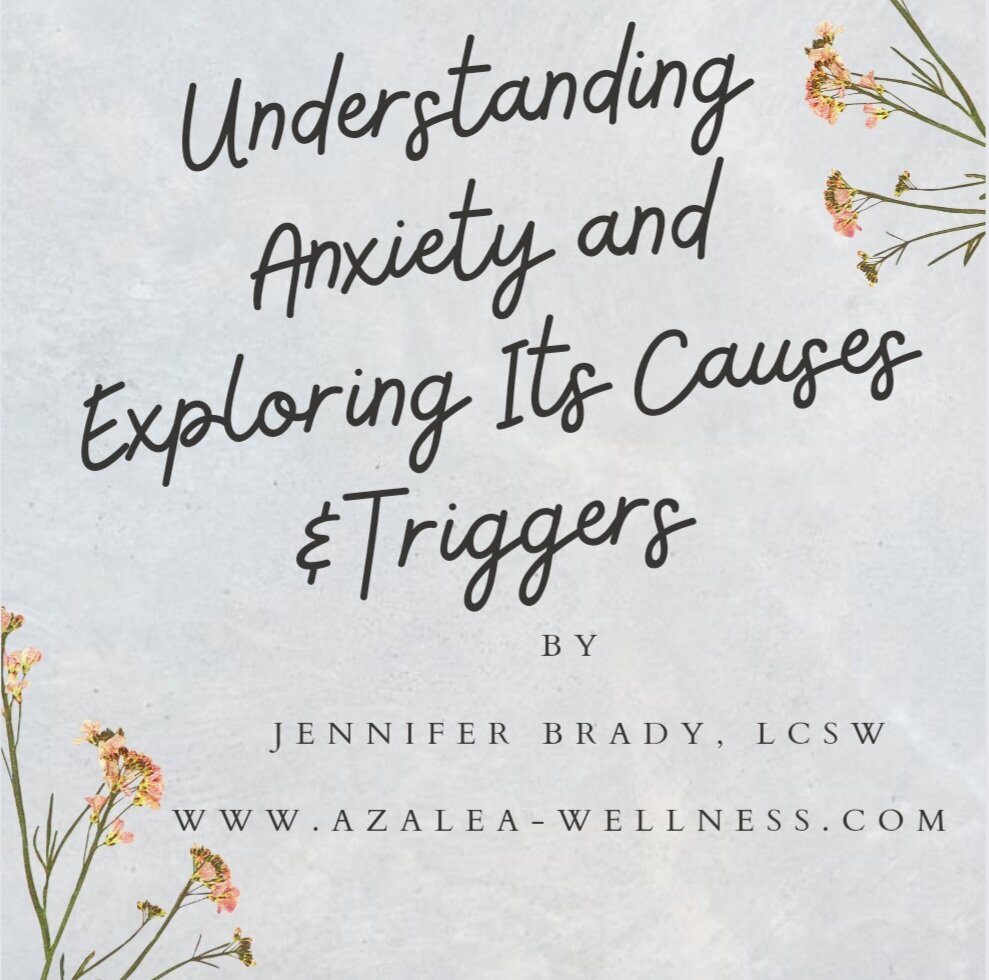From the Desk of an Anxiety Therapist in Colchester, CT: Understanding Anxiety and Exploring Its Causes and Triggers
/From the Desk of an Anxiety Therapist in Colchester, CT: Understanding Anxiety and Exploring Its Causes and Triggers by Jennifer Brady, LCSW
Introduction to Anxiety
Understanding Anxiety and Exploring It’s Causes & Triggers
Anxiety is a common mental health condition that affects millions of people worldwide. It can manifest in various forms, such as generalized anxiety disorder, panic disorder, social anxiety disorder, or specific phobias. As a therapist, I often encounter individuals struggling with anxiety, and understanding the causes and triggers of this condition is crucial in providing effective support and treatment. In this blog post, I will delve into the complex nature of anxiety, exploring its underlying causes and common triggers.
Anxiety Counseling in Colchester, CT
Causes of Anxiety
1. Biological Factors: Research suggests that certain biological factors can contribute to the development of anxiety disorders. These include an imbalance of neurotransmitters in the brain, genetic predisposition, and an overactive stress response system. Individuals with a family history of anxiety or other mental health conditions may be more susceptible to experiencing anxiety themselves.
2. Environmental Factors: Environmental factors can also play a significant role in the development of anxiety. Traumatic events, such as abuse, loss, or accidents, can leave a lasting impact on an individual's mental well-being, potentially leading to anxiety disorders. Additionally, chronic stress, dysfunctional family dynamics, or a demanding work environment can contribute to the onset of anxiety symptoms.
3. Learned Behavior: Anxiety can be learned through observation and conditioning. If a person grows up in an environment where anxiety is prevalent, they may adopt anxious thought patterns and behaviors. Similarly, experiencing a traumatic event or witnessing others' anxious reactions can create a heightened sensitivity to potential threats, leading to the development of anxiety disorders.
Common Triggers of Anxiety
1. Stressful Life Events: Significant life changes, such as starting a new job, moving to a new city, or ending a relationship, can trigger anxiety symptoms. These events disrupt our sense of familiarity and stability, often causing feelings of uncertainty and apprehension. It's important to note that what may be stressful for one person may not be for another, as individuals have different coping mechanisms and resilience levels.
2. Social Situations: For individuals with social anxiety disorder, certain social situations can trigger intense anxiety. Examples include public speaking, attending parties or social gatherings, or interacting with strangers. Fear of judgment, humiliation, or embarrassment in these situations can cause individuals to avoid them altogether, impacting their daily lives and relationships.
3. Phobias and Triggers: Specific phobias are another form of anxiety disorder. They involve an intense and irrational fear of a particular object or situation, such as heights, spiders, flying, or enclosed spaces. Exposure to these phobias or triggers can lead to overwhelming anxiety, often prompting individuals to avoid them at all costs.
4. Cognitive Triggers: Anxiety can also be triggered by certain thought patterns and beliefs. Negative self-talk, catastrophizing, or excessive worry about the future can contribute to anxiety symptoms. Unrealistic expectations, perfectionism, or a constant need for control can create a chronic state of anxiety, as individuals continuously strive to meet high standards or anticipate worst-case scenarios.
Anxiety is treatable.
There Is Hope
Understanding the causes and triggers of anxiety is crucial for both individuals experiencing anxiety and the professionals supporting them. By recognizing the biological, environmental, and learned factors that contribute to anxiety disorders, therapists can tailor treatment plans to address the root causes effectively. Additionally, identifying common triggers allows individuals to develop coping strategies and implement self-care techniques to manage their anxiety symptoms.
It's important to remember that anxiety is a treatable condition, and seeking professional help is a courageous step towards regaining control of one's mental well-being. Therapists, in collaboration with their clients, can work towards developing personalized strategies, incorporating techniques such as cognitive-behavioral therapy (CBT), Eye Movement Desensitization Reprocessing therapy (EMDR), mindfulness, and relaxation exercises to help individuals navigate their anxiety.
Remember, anxiety doesn't define you. With the right support and a comprehensive understanding of its causes and triggers, you can learn to manage anxiety and lead a fulfilling life focused on your well-being and personal growth.
Anxiety Therapy in Colchester, CT
If you are experiencing severe or persistent anxiety symptoms, it is important to consult with a healthcare professional or mental health provider for an evaluation and appropriate treatment. I provide online telehealth therapy for adults who are experiencing anxiety. Call or email to schedule a free 15-minute phone consultation to see if we are a good fit.


